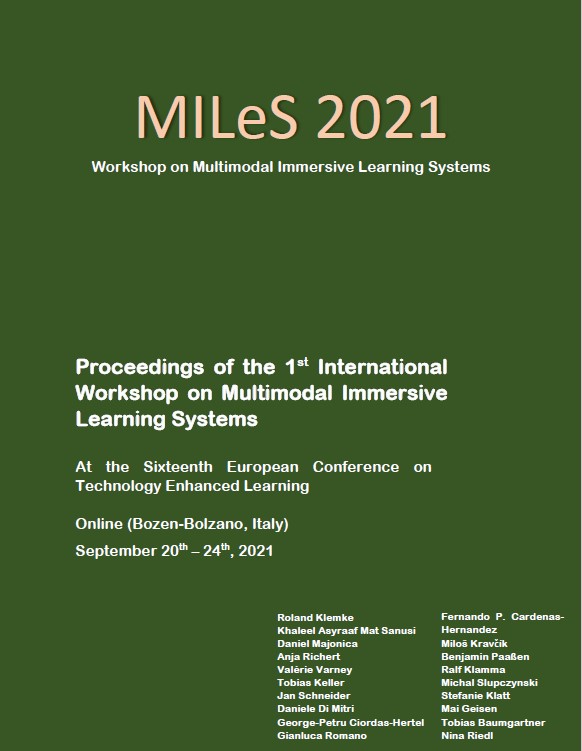MILeS 2021 – Multimodal Immersive Learning Systems
First International Workshop
All the accepted contributions were published in the CEUR Proceedings – http://ceur-ws.org/Vol-2979/

Description
Advances in the related fields of wearable sensors, augmented reality, artificial intelligence, and machine learning make it possible to connect these technologies into integrated learning solutions. The intersection of these fields of emerging technologies is an area of a lot of opportunities for innovative learning systems, but likewise a field of fuzzy expectations. With this workshop, we want to contribute to the systematic organisation of the field and to the advancement of solutions.
The MILeS 2021 workshop is organised in the context of the German BMBF-funded research project MILKI-PSY, which aims to develop AI-supported, data-intensive, multimodal, immersive learning environments for the independent learning of psychomotor skills. This leads to a cross-domain approach that makes it possible to record the activities of experts in a multimodal manner and to use these recordings as blueprints for learners. With the help of AI-based analysis, learning progress is to be supported by automated error detection and automatically generated, individual feedback. This creates holistic, innovative environments for cultivating psychomotor skills, in which personalized AI support enables individual learning processes based on complex data analyses.
With the interdisciplinary workshop, we aim to bring together experts and practitioners from technology-enhanced learning and educational application of technologies to collect ideas, requirements, best practices, and example cases in the intersection of Artificial Intelligence, Multimodal Systems, Immersive Systems, and their application into actual education.
Topics
- Mobile, wearable, and pervasive technologies
- Sensors, sensor networks, and Internet of Things
- Augmented reality, virtual reality, and mixed reality
- Artificial intelligence
Agenda
All times are indicated in CEST/Europe.
| Time | Agenda |
|---|---|
| 13:00 – 13:10 | Introductory session |
| 13:10 – 13:20 | Pitch session 1 1. Tobias Keller, Valerie Varney and Anja Richert. WIP: Development of a design framework for the provision of multimodal content in an AR-based training system for the acquisition of psychomotor skills. (Slides) 2. Mai Geisen, Tobias Baumgartner, Nina Riedl and Stefanie Klatt. Real-time visual feedback on sports performance in an immersive training environment: Presentation of a study concept. |
| 13:20 – 13:50 | Cafe‘ session 1 – Discussion |
| 13:50 – 14:00 | Pitch session 2 3. Tristan Quin, Bibeg Limbu, Michel Beerens and Marcus Specht. HoloLearn: Using holograms to support naturalistic interaction in virtual classrooms. 4. Benjamin Paaßen and Miloš Kravčík. Teaching psychomotor skills using machine learning for error detection. |
| 14:00 – 14:30 | Cafe‘ session 2 – Discussion |
| 14:30 – 14:40 | Coffee break |
| 14:40 – 14:50 | Pitch session 3 5. Khaleel Asyraaf Mat Sanusi, Daniel Majonica, Lukas Künz and Roland Klemke. Immersive training environments for psychomotor skills development: A student driven prototype development approach. (Slides) 6. Fernando P. Cardenas-Hernandez and Gianluca Romano. Multimodal Immersive Learning with Artificial Intelligence for Robot and Running application cases. (Slides) |
| 14:50 – 15:20 | Cafe‘ session 3 – Discussion |
| 15:20 – 15:30 | Pitch session 4 7. Michal Slupczynski and Ralf Klamma. DevOpsUse for machine learning and blockchains as multimodal learning analytics services. 8. Olivier Dikken, Bibeg Limbu and Marcus Specht. Expert Distribution Similarity Model: Feedback methodology for non-imitation based handwriting practice. (Slides) |
| 15:30 – 16:00 | Cafe‘ session 4 – Discussion |
| 16:00 – 16:10 | Closing session |
Programme Committee and Organisers
- Roland Klemke, TH Köln and Open Universiteit Nederland
- Khaleel Asyraaf Mat Sanusi, TH Köln
- Daniel Majonica, TH Köln
- Anja Richert, TH Köln
- Valerie Varney, TH Köln
- Tobias Keller, TH Köln
- Jan Schneider, DIPF
- Daniele Di Mitri, DIPF
- George-Petru Ciordas-Hertel, DIPF
- Fernando P. Cardenas-Hernandez, DIPF
- Gianluca Romano, DIPF
- Miloš Kravčík, DFKI
- Benjamin Paaßen, DFKI
- Ralf Klamma, RWTH
- Michal Slupczynski, RWTH
- Stefanie Klatt, Deutsche Sporthochschule
- Mai Geisen, Deutsche Sporthochschule
- Tobias Baumgartner, Deutsche Sporthochschule
- Nina Riedl, Deutsche Sporthochschule
